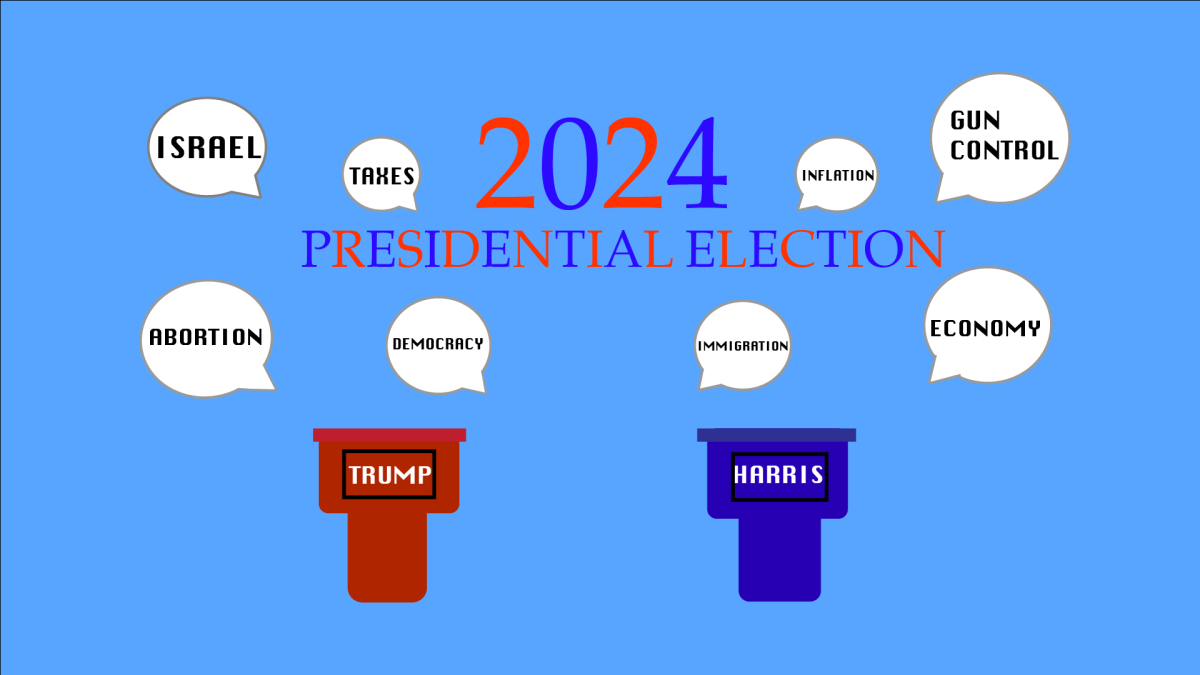President Barack Obama and former Massachusetts Governor Mitt Romney both believe that Iran should not acquire a nuclear weapon, so it won’t be able to threaten the security of America and Israel, but they differ on how to prevent Iran from getting one.
The two presidential candidates also disagree about Israel and the Palestinians – also among the most important issues to Shalhevet students and teachers and the Jewish community – and about taxes and healthcare, among other issues that are filling the campaign season.
According to the official White House website, “The United States is committed to a comprehensive, just, and lasting peace in the Middle East,” under President Obama, “including two states for two peoples – Israel as a Jewish state and the homeland for the Jewish people and the State of Palestine as the homeland for the Palestinian people – each enjoying self-determination, mutual recognition, and peace.”
The website says the president wants all countries to reduce their number of nuclear weapons, and he wants to use diplomacy and economic sanctions to prevent Iran from obtaining one. President Obama has said that military action is an option if Iran gets close to making a nuclear weapon, but hopes that continued negotiations and sanctions will make Iran shut down its nuclear program so war won’t be necessary.
“America wants to resolve this issue through diplomacy,” President Obama told the United Nations last month, “and we believe that there is still time and space to do so, but that time is not unlimited.”
Gov. Romney believes that economic sanctions and negotiations are not enough.
“The president should have built a credible threat of military action and made it very clear that the United States of America is willing, in the final analysis, if necessary, to take military action to keep Iran from having a nuclear weapon,” said Gov. Romney last January during a GOP primary debate at St. Anselm College in New Hampshire.
In last Monday’s foreign policy debate with President Obama, however, Romney changed his view.
“It’s also essential for us to understand what our mission is in Iran, and that is to dissuade Iran from having a nuclear weapon through peaceful and diplomatic means,” said Romney. “And crippling sanctions are something I’d called for five years ago…”
General Studies Principal Mr. Roy Danovitch believes that the candidates actually have similar views on Iran.
“Both candidates hope economic sanctions will work,” said Mr. Danovitch. “Romney is a bit more aggressive with sounding an alarm, while Obama also recognizes the value of sanctions. He wants to protect the Iranian people and not overdramatize the issue.”
On the subject of Israel, Gov. Romney has said that any negotiations between Israel and the Palestinians must happen between them alone, without the involvement of other countries. President Obama agrees that negotiations just between Israel and the Palestinians would be more productive than getting the UN involved.
Science and math teacher Mr. Chris Buckley, who also coaches the debate teams, believes that Romney is a stronger supporter of Israel.
“Romney pledges to stand unequivocally with Israel, while Obama’s support of Israel has been very tepid,” said Mr. Buckley.
Mr. Danovitch thinks that Obama is very supportive of Israel as well.
“Obama supports Israel,” said Mr. Danovitch. “He recognizes that Israel’s interest is America’s interest.”
To deal with a slow economy, high unemployment, and a deficit of over $16 trillion, both candidates believe that the federal government needs to cut spending, but they differ in their views of taxes and in determining where spending cuts are most appropriate.
Mr. Buckley said that taxation is one of the main differences in policy between Obama and Romney.
“Romney wants to broaden the tax base by lessening deductions, so more people will pay less expensive taxes,” said Mr. Buckley. “Obama wants to increase the tax on the wealthy, so less people will be paying larger taxes—thereby punishing success.”
President Obama believes wealthy Americans should bear a greater tax burden, and would like to raise the federal income tax rate on Americans who earn more than $250,000 a year, saying that budget cuts alone will not be enough to solve the deficit problem and that tax cuts will make it worse.
“Right now, because of loopholes and shelters in the tax code, a quarter of all millionaires pay lower tax rates than millions of middle-class households,” said Obama in his State of the Union address last January.
“If you make under $250,000 a year, like 98 percent of American families, your taxes shouldn’t go up. You’re the ones struggling with rising costs and stagnant wages. You’re the ones who need relief.”
President Obama thinks that Gov. Romney’s plan doesn’t make sense, because Romney claims he’ll cut taxes and spending, but he doesn’t say which government programs he will cut—which will have to be a lot to pay back the deficit.
Mitt Romney wants to make the Bush era-tax cuts, which provided tax breaks to the wealthy and large companies, permanent. He believes that if people and businesses are spending less money on taxes, they will have more money to invest in their companies and thereby in the economy.
Gov. Romney also does not want the government to issue more federal bonds to support spending. During the first presidential debate Oct. 3, Gov. Romney said this question should be asked about each federal program: “Is it so important, so critical, that it is worth borrowing money from China to pay for it?”
Perhaps the greatest chasm exists between the candidates when it comes to how each candidate plans to solve the healthcare crisis. Healthcare costs and health insurance premiums have continued to rise both in the private sector and in government programs, and millions of Americans are uninsured.
According to the provisions of the Affordable Care Act – also known as Obamacare – which Congress passed in 2010, starting in 2014 Americans who refuse to buy health insurance would pay a fine. Having more healthy people insured would presumably bring enough money into the system to support care for more people who are ill.
The law also mandates free preventative care and seeks to ensure that insurance companies don’t exploit American citizens by raising premiums and cutting back benefits. Also, Insurance companies already cannot cancel insurance when their policy-holders get sick, nor refuse insurance to applicants with pre-existing medical conditions.
Mitt Romney says he would start working to repeal the Affordable Care Act on his first day in office. He authored a similar health care plan in Massachusetts while governor, and says he believes that individual states should make these policies, not the federal government.
As seen in a recent poll, Shalhevet students favor Gov. Romney by a large margin. The results of the Jewish vote will likely be analyzed after Election Day.
Related Stories:
Electorate may be divided but Shalhevet students have a clear favorite: Romney







